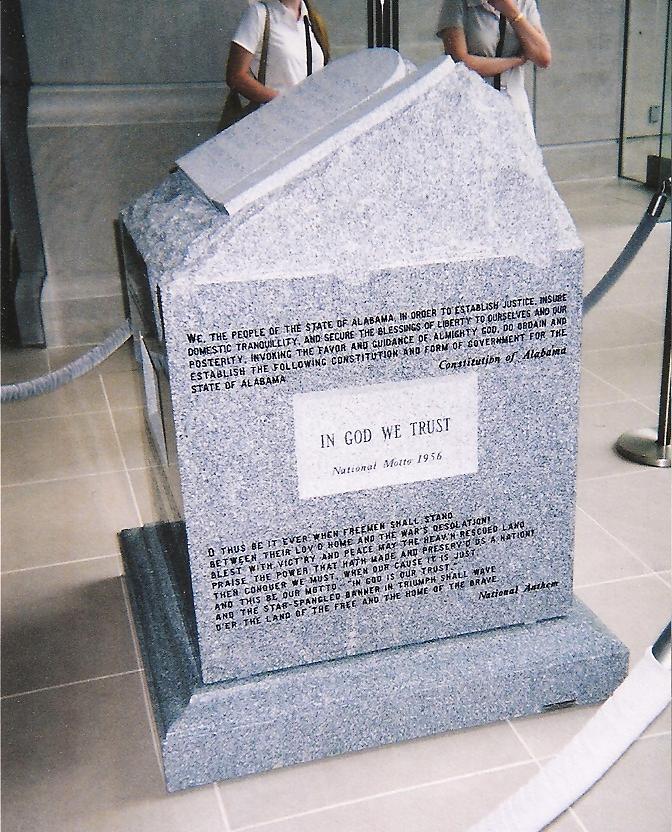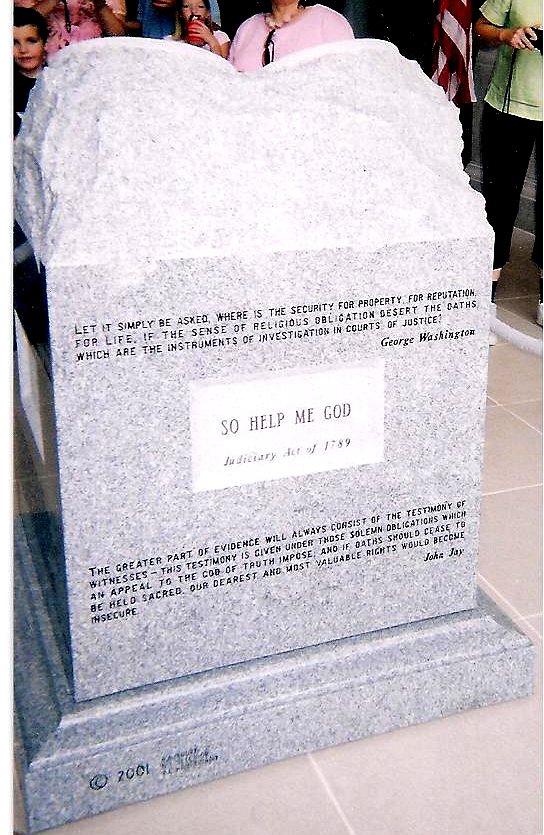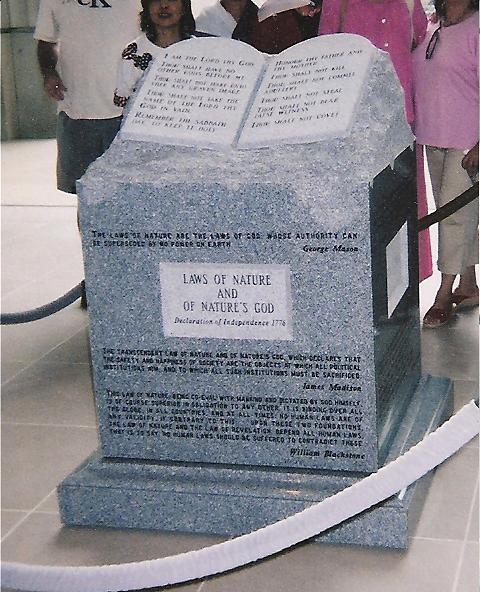Constitution
The Ten Commandments come back
Yesterday (June 19, 2024), Louisiana started requiring prominent Ten Commandments displays in all public-school classrooms. Gov. Jeff Landry (R-La.) signed the bill into law in the afternoon. In so doing he provoked an immediate court fight – to which he is no stranger. (He was the original Attorney General of Louisiana who helped file Missouri v. Biden, the landmark censorship case.) This litigation is welcome – especially if provokes a larger debate on whether the Framers of the Constitution truly intended, as Roger Baldwin (of ACLU fame) alleged, that the Constitution mandates a secular government.
History of the Ten Commandments
The Ten Commandments, of course, fall within Exodus (in Hebrew, Shemot Names), chapter 20, verses 1-17. Their most concise rendition reads:
You shall have no other gods before Me.
You shall not make for yourself [any] idol, [nor] worship them or serve them.
You shall not take the Name of the LORD your God in vain.
Remember the Sabbath day, to keep it holy.
Honor your father and your mother.
You shall not [commit] murder.
You shall not commit adultery.
You shall not steal.
You shall not give false testimony against your neighbor.
You shall not covet.
The first four of these are the most specific, for they cover man’s relationship with God. Few religious traditions are as specific about this relationship as are Judaism and Christianity. But to the other six, covering man’s relationship with man, none can object to with any justice. Commandment No. 5 is a sensible attitude toward one’s parents or guardians. Each of the next four is a specific prohibition of a recognizable crime. Finally, Commandment No. 10 sets the boundary between neighbor and neighbor, that no one should cross. To covet in this context means to desire to have that specific thing that belongs to someone else. Even Ayn Rand, atheist that she was, held Commandments 6, 8, 9, and 10 as necessary to ordered liberty.
The Great Alabama Ten Commandments Monument Case
In 2001, Roy Moore, as Chief Justice of Alabama, famously commissioned a heavy granite block to honor the Ten Commandments. This monument rested in the rotunda of the Judiciary Building.




On top were the two classic tablets, with semicircular top edges, listing the Ten Commandments in English. Each side of the block bore a simple phrase from one or more of America’s founding documents, as follows:
- “Laws of Nature and of Nature’s God” (Declaration of Independence),
- “In God we trust.” (motto on the nation’s coin and currency),
- “So help me God” (part of the Presidential Oath of Office, as the Constitution specifies), and
- The last part of the Pledge of Allegiance, beginning with “One Nation, under God,…” and continuing to the end.
Each message had several prominent quotes surrounding it, to amplify its meaning.1
Three Alabama attorneys sued the State, alleging violation of the Establishment Clause of the First Amendment to the U.S. Constitution.Glassroth et al. v. Moore.Three activist organizations supported the plaintiffs:
- Southern Poverty Law Center,
- American Civil Liberties Union of Alabama, and
- Americans United for the Separation of Church and State.
As their Injury in Fact (the prime element of standing), the three said the display of the Ten Commandments showed:
- Prejudice against any of their clients who were neither Jew nor Christian, and
- Substitution of religious law for Constitutional and statutory law in the decision of their cases.
It flunked the Lemon Test
Judge Myron Thompson of the U.S. District Court for the Middle District of Alabama agreed. On November 18, 2002, Judge Thompson, citing Lemon v. Kurtzman, found the monument to fail the Lemon Test of Secularity of Purpose. The Court of Appeals for the Eleventh Judicial Circuit ultimately affirmed.
Judge Thompson, the affirmation in hand, ordered Judge Moore to remove the block by August 20, 2003. Moore refused, saying that he would be in violation of his oath of office if he so acted. So on August 21 the other eight Justices of the Supreme Court voted to remove the block. The next day, the Alabama Court of the Judiciary filed an ethics complaint against Moore. Workmen, operating under the direction of the rest of the Supreme Court, moved the monument to a back room. Judge Moore lost his job on November 13, 2003. The next day, workmen removed the block from the building entirely. But no one has ever destroyed the block. Moore still goes on the lecture circuit, and takes the block with him on his travels.
Fast-forward to today
Louisiana’s new law took effect yesterday, according to Charlotte Hazard of Just the News. The Associated Press (per KXAN-TV, Channel 36 (NBC), Austin, Texas) gave the details:
The legislation that Republican Gov. Jeff Landry signed into law on Wednesday requires a poster-sized display of the Ten Commandments in “large, easily readable font” in all public classrooms, from kindergarten to state-funded universities.
A four-paragraph statement of context, pointing out that the Ten Commandments “were a prominent part of American education for almost three centuries,” will accompany each display. These displays must be in place by the beginning of the calendar year 2025. This law also authorizes, but does not require, the display of other supporting documents, including (apparently without limitation) the:
- Mayflower Compact (which begins In the Name of God, Amen),
- Declaration of Independence (with references to Laws of Nature and Nature’s God, the Supreme Judge of the world, etc.), and
- Northwest Ordinance, the first governing instrument for America’s Northwestern territories.
Private donations will fund the creation and placement of all such displays.
Although this is the first such State law to go into force, it is not the first such law any State legislature has considered. The Texas Legislature considered such a bill last April, in response to a more recent Supreme Court precedent. See Kennedy v. Bremerton School District from the 2021 Term.
The lawsuits begin already
Already three secularist organizations have vowed to sue the State to negate this law:
- American Civil Liberties Union,
- Americans United for Separation of Church and State, and
- Freedom From Religion Foundation.
In a joint statement yesterday afternoon, they said:
Even among those who may believe in some version of the Ten Commandments, the particular text that they adhere to can differ by religious denomination or tradition. The government should not be taking sides in this theological debate.
That’s actually a significantly weaker statement than the allegations of injury by the three plaintiffs in Glassroth v. Moore. These latest prospective plaintiffs have listed only a philosophical theory. That’s not a true articulation of an Injury in Fact – and without that, they would lack standing. Exactly how they will allege injury, remains for a court to see. But in one respect they have already made an invalid statement. “The government should not be taking sides,” they say. But by refusing any such display, the government is taking the side of declaring them invalid, incompetent, irrelevant and immaterial.
Furthermore, the only differences in text arise from differing translations. Those three are alleging that a court will find that the selection of a particular translation will show prejudice against the others. Note that Glassroth and his colleagues did not see fit to argue over translations of the Ten Commandment. True, some church leaders see fit to champion one translation over all others, and even attach theological significance to it. But the real problem with human translation has always been accuracy, and few translations are so inaccurate as to risk disseminating bad doctrine. Thus far, CNAV has seen no official translation that creates a problem with the Ten Commandments.
A different legal climate
More to the point, the legal climate today is drastically different from the climate in 2003 for the Glassroth case. First and foremost, Lemon v. Kurtzman is no longer operative, because the Kennedy precedent supersedes it. Another superseding case is Carson v. Makin, which forbids the government to discriminate against religious adherents in public programs. The AP article referred to a 1980 Ten Commandments display law in Kentucky, that the then-constituted Supreme Court invalidated. Again: that was before Kennedy and in fact a mere nine years after Lemon. Remember, also, the radically different composition of the Court:
- Warren Burger (Chief Justice),
- Harry Blackmun,
- William J. Brennan,
- Thurgood Marshall,
- Lewis F. Powell,
- William Rehnquist,
- John Paul Stevens,
- Potter Stewart, and
- Byron White.
This was a Liberal court by any stretch, so their upholding of Lemon was part for the course. Recall also that the Lemon courtdecided Roe v. Wade. Today we have three Originalists, three Liberals, and three Moderates.
How the Originalists could defend the Ten Commandments
Lay aside for a moment the Court’s recent invalidation of Lemon, and their arguable repudiation of James G. Blaine’s principles. The Originallsts showed a clear predilection for historical analysis in another, unrelated case. New York State Rifle and Pistol Association v. Bruen. That historical analysis would inevitably lead to the Mayflower Compact and the Declaration, both of which documents mention God prominently. Even the Constitution mentions God, in the Presidential Oath of Office. Indeed, the Preambles to the Constitutions of every State in the Union mention God and give Him thanks.
Beyond that, nine prominent Americans, all of whom flourished at the time of the establishment of the Constitution, mentioned God prominently in their writings. These included John Adams, second President of the United States, who famously declared that:
Our Constitution was made only for a moral and religious people. It is wholly inadequate to the government of any other.
Include also:
- Patrick Henry, governor of Virginia,
- John Jay, first Chief Justice of the United States,
- Thomas Jefferson and James Madison, third and fourth Presidents,
- Benjamin Rush, signer of the Declaration of Independence,
- George Washington, the first President, and before that, Commander of the Continental Army,
- Noah Webster (the Lexicographer), and
- Daniel Webster, United States Senator and Secretary of State.
Also include Abigail Adams, John’s wife, who asked pointedly how anyone could be patriotic and not God-fearing.
An interesting trial record
Add to it: if anyone wants to try the very concept of God, let them call any of several witnesses ready to introduce hard evidence for the Global Flood and even for the historicity of Jesus Christ – Who happens to be the Best-attested Figure in all of human history.
Which brings up one other question for everyone reading this. Anyone who questions the importance of creation science, now has the answer to the question. Roger Baldwin founded something he called the American Civil Liberties Union to litigate God out of public life. Before him, James G. Blaine gallivanted across the country passing religious disestablishment amendments that he modeled – in part – on the federal First Amendment. And, of course, Clarence Darrow cleverly argued the case for atheism in the case of Tennessee v. John T. Scopes. Yet not until Charles Darwin and Alfred Russell Wallace published their Origin of Species did anyone seriously question God’s Existence. So creation science serves to show that atheism and secularism are utterly without scientific foundation.
And while America argues the concept of God and the validity of honoring Him in public policy, maybe someone can prepare to argue for an actual right to life under the Constitution.
Imagine…
In closing: what can be so important about the Ten Commandments, and the religious traditions from which they come? What does one gain from believing in God, and lose by not believing? Lay aside – but only for a moment – that eternal separation from God will not be a good place to be! The Evangelist and Physician, Saint Luke, gave a description of that place that should make anyone shudder. (Luke 16:19-31.)
But for the moment, lay that aside. Now imagine going through life, and finding in it neither meaning nor purpose. Imagine not even having a solid basis for ethics. Ayn Rand tried to work out an ethical system using “man’s life” as a value standard. But under that system, a law against murder is only a mutual decision, to create an ordered society. Suppose your neighbor doesn’t value order, or indeed anything but satisfying his desires of the moment? Upon what basis can you tell him, “You haven’t that right”?
The Ten Commandments provide the structure necessary for order in society. It is a set of Rules that apply to everyone. Furthermore, the God in Whom so many would rather not believe, is a Rudder to help one steer through life, and a Wind to fill one’s sails for motive power. In short, humans are better off with God than without Him, even apart from Saint Luke’s dire description of the final destination.
1 The four photographs shown in the gallery are by Angela Orlando, who on August 16 2003 visited the monument. She has licensed her photographs under the Creative Comomons Attribution/Share-alike 2.0 Generic License.
Terry A. Hurlbut has been a student of politics, philosophy, and science for more than 35 years. He is a graduate of Yale College and has served as a physician-level laboratory administrator in a 250-bed community hospital. He also is a serious student of the Bible, is conversant in its two primary original languages, and has followed the creation-science movement closely since 1993.
-

 Accountability3 days ago
Accountability3 days agoWaste of the Day: Principal Bought Lobster with School Funds
-

 Constitution2 days ago
Constitution2 days agoTrump, Canada, and the Constitutional Problem Beneath the Bridge
-

 Executive1 day ago
Executive1 day agoHow Relaxed COVID-Era Rules Fueled Minnesota’s Biggest Scam
-

 Civilization3 hours ago
Civilization3 hours agoWhy Europe Shouldn’t Be Upset at Trump’s Venezuelan Actions
-

 Civilization1 day ago
Civilization1 day agoThe End of Purple States and Competitive Districts
-

 Civilization5 days ago
Civilization5 days agoThe devil is in the details
-

 Executive4 days ago
Executive4 days agoTwo New Books Bash Covid Failures
-

 Executive16 hours ago
Executive16 hours agoWaste of the Day: Can You Hear Me Now?














